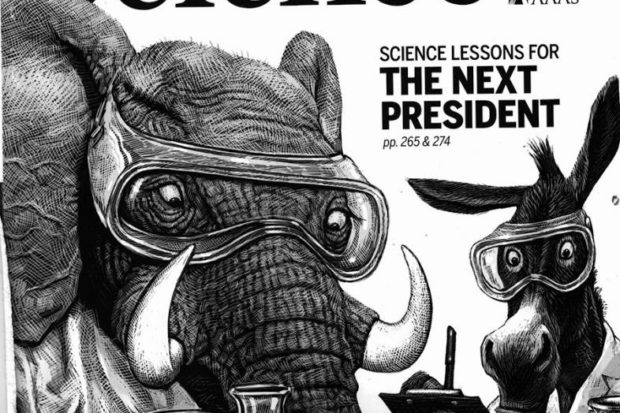
By George B. Kauffman
Before our recent election, several science journalists wrote a detailed article titled “Science Lessons for the Next President,” Science October 21, 2016, 354(6310), 224-279. http://science.sciencemag.org/content/354/6310/274.full. Science is the flagship journal of the American Association for the Advancement of Science. (AAAS), the first permanent organization formed to promote the development of science and engineering at the national level and to represent the interests of all its disciplines. Its foundation in 1848 marked the emergence of a national scientific community in the United States.
The article analyzes the track records of the past 13 presidents (Franklin Delano Roosevelt through Barack Obama) on science-related issues and examines five that the incoming president will face and a caveat on how not to deal with them.
- Evolution promises unpleasant surprises. Evolving pathogens are changing faster than our defenses, and they threaten our food and water supplies. In the USA 2 million people develop antibiotic-resistant infections annually, and 23,000 of them die. We must be ready to deal with serious global pandemics, but regulations shouldn’t stifle needed research.
- The genome–editing revolution beckons. See Kauffman, G. B. Editing Genes in Human Embryos Raises Ethical Questions. Community Alliance, August 1, 2015. https://fresnoalliance.com/editing-genes-in-human-embryos-raises-ethical-questions. CRISPR is a new gene-editing technology that makes it faster, easier, and cheaper to alter the DNA of any organism – from bacteria to people. It could lead to new treatments for genetic diseases in humans, pest-resistant crops with higher yields, and disease-resistant livestock. However, should the government fund CRISPR editing of human embryos that might be used to make babies that are free of known genetic defects and even have enhanced traits?
- Seas are rising sooner than you think. One of our most pressing problems is anthropogenic (human-caused) climate change. Regional variations in sea levels are already causing floods (Almost 40 percent of our population lives near the coast). Our government must cooperate with other nations to reduce the global emissions of greenhouse gasses (GHGs) that are driving sea level rise.
- Brain health should be top of mind. Brain health affects all of us from cradle to grave, and when brain disease strikes, the costs, both personal and budgetary, are staggering. By 2015, 7 million of us are expected to suffer from Alzheimer’s disease. The new president must have a plan to cope with this.
- Machines are getting much, much smarter. The next president must decide how much the federal government should spend on Artificial Intelligence (AI) and must carefully monitor its impact on the economy, workforce, and national security.
- We aren’t so great at assessing risk. Gut instinct can lead to poor policy. Experts rely on statistics, but ordinary people INCLUDING YOU KNOW WHO!!! rely on gut instinct, which may push a president to overreact to lesser threats and underreact to greater problems. He will need to react to known risks, including terrorist attacks, foreign conflicts, domestic crime, flu pandemics, and natural disasters.
Community Alliance readers know how Donald J. Trump will react on the above issues. You may also wish to read Hoy, A. Q. AAAS Explores Science Policy in Incoming Trump Administration, Science November 17, 2016. http://www.aaas.org/news/aaas-explores-science-policy-incoming-trump-administration and Kopplin, Z. Trump met with prominent anti-vaccine activists during the campaign. Science November 18, 2016. http://www.sciencemag.org/news/2016/11/trump-met-prominent-anti-vaccine-activists-during-campaign. An additional 3.4 billion metric tons of U.S. CO2 emissions are expected under a Trump presidency compared to a Hillary Clinton presidency. Chem. Eng. News November 1, 2016, 94(44), 14.
*****
George B. Kauffman, Ph.D., chemistry professor emeritus at California State University, Fresno and Guggenheim Fellow, is recipient of the American Chemical Society’s George C. Pimentel Award in Chemical Education, Helen M. Free Award for Public Outreach, and Award for Research at an Undergraduate Institution, and numerous domestic and international honors. In 2002 and 2011, he was appointed a Fellow of the American Association for the Advancement of Science and the American Chemical Society, respectively.
